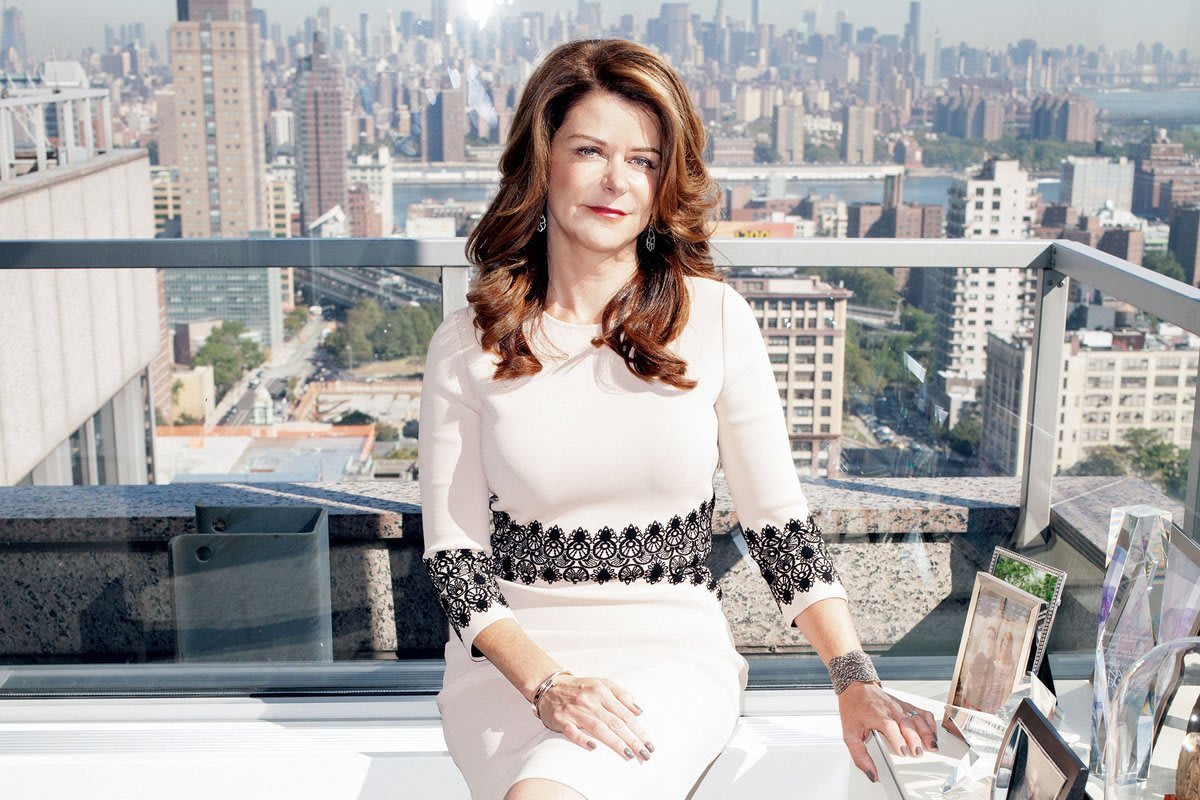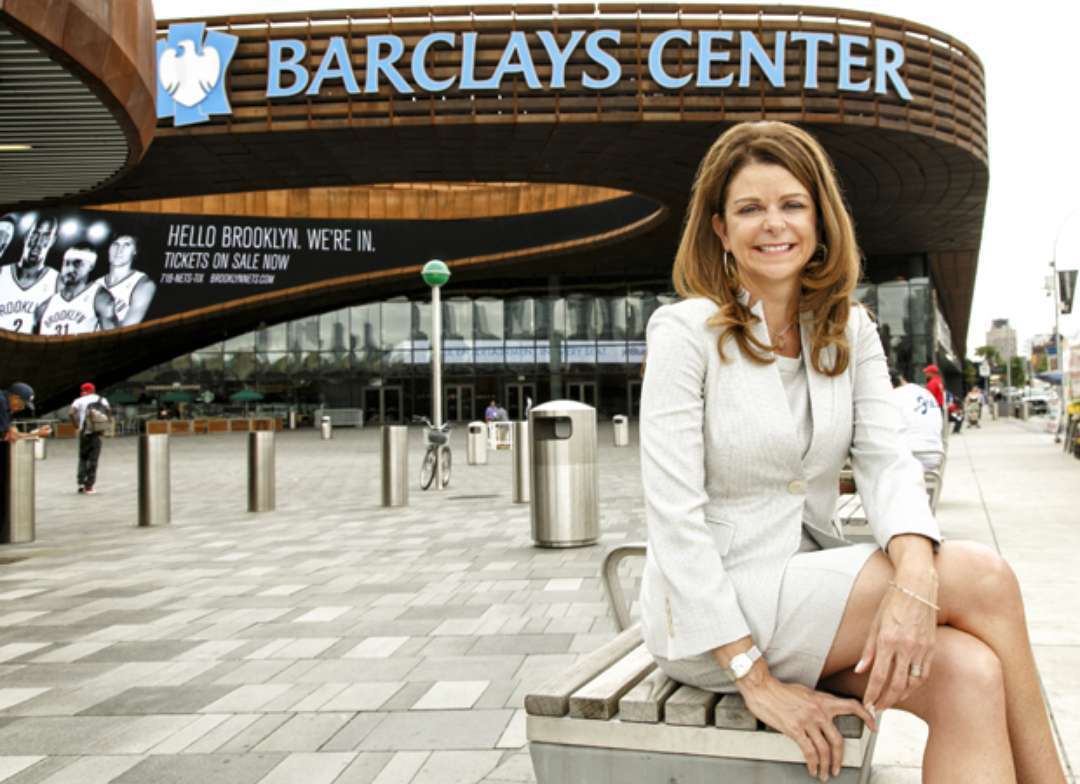
Every few months I feature an interview from The Closing, a Q&A with outstanding New York City real estate developers. This month the focus is on MaryAnne Gilmartin, CEO of Forest City Ratner and, fittingly, the landlord of Hillary Clinton’s campaign headquarters at 1 Pierrepoint Plaza in Brooklyn. Whereas most real estate development leaders are brought into the business through family connections, Gilmartin entered the world of development as a complete outsider 30 years ago and has been breaking glass ceilings in a male-dominated industry ever since. You may know Forest City Ratner as the developer of Pacific Park (formerly Atlantic Yards) as well as the New York by Gehry building and The New York Times headquarters.
Interview conducted in 2010 by Candace Taylor.
MaryAnne Gilmartin is the executive vice president of commercial and residential development [now CEO and President] at Forest City Ratner Companies, where she’s been since 1994. She’s overseeing the controversial $4 billion, 22-acre Atlantic Yards development, one of the most significant developments in Brooklyn’s history. She also led the construction of the new 1.6 million-square-foot New York Times headquarters in Midtown. Before working at FCRC, she participated in the city’s Urban Fellows Program and spent seven years at the Public Development Corporation (now the EDC).
When were you born?
May 28, 1964.
Where did you grow up?
I was born in Queens. My father left when I was young. Rockaway Beach was his playground, and so we moved to my mother’s preferred playground, Woodstock, N.Y.
How many siblings do you have?
Two sisters and two [half] brothers. I’m the second oldest.
How did your father’s leaving affect you?
It cultivated a fierce sense of independence, and a determination to be a different kind of parent and a provider for my family. I think it also taught me that nobody will bring you happiness; you make it yourself.
What kind of kid were you?
I was the nurturer to the younger siblings. The fixer. And I was an exceptionally good student, a curious learner. School was predictable, focused and rewarding, whereas home life was a lot more chaotic.
Where did you go to college?
I was offered a generous scholarship and financial package by Fordham. We were broke at the time so I worked two jobs during my four years there: work-study and waiting tables at Jerry and Val’s Seafood Café at 76th and Third Avenue. Everybody should have to wait tables at one point in their life. It teaches you how to multitask and treat people with dignity.
How did you meet your husband?
We met on campus the first week I was at Fordham. We were friends. I had a huge crush on him. But it didn’t become a romance until our five-year reunion. We married in 1995, when I was about 30. I had a rule: I didn’t want to be married before 30. I thought my 20s were meant to be lived as a single woman in the city.
Where did you live when you were single?
I lived in Brooklyn for quite a few years. I had an amazing apartment on Atlantic Avenue across from the prison, when they still did conjugal visits. (laughs)
How do you get from your house in Westchester to Forest City’s headquarters in Downtown Brooklyn every day?
I have a driver … I used to laugh with Bruce [Ratner] when I was pregnant with each of my children that I would go into labor on the BQE and have to name one of them after an exit.
I read that your husband stays home with your kids.
I slay the dragon every day and my husband is the quiet warrior. He nurtures and cultivates our home life. It’s the secret to my success in so many ways.
How did that come about?
He went into the police department and then got his law degree. After 9/11, we looked at our life and said we wanted to participate in as meaningful a way possible in raising our children. I had the better gig, so he was willing to give it a whirl. I like to say he couldn’t pack a diaper bag in 2001. Now he’s quite good.
How old are your kids?
Devin is 13, Aidan is 11, and Tess is 6.
How did you end up in development?
It was really serendipity and a little bit of air-conditioning. For the Urban Fellows Program, you interviewed with city commissioners. I toured the various agencies and was aghast at the conditions — desks in the hall, fairly deplorable buildings. I arrived for my interview at the PDC, and it was air-conditioned and carpeted. I thought, let me try public development.
What has been challenging for you personally about the opposition to Atlantic Yards?
It’s a complicated project with lots of dimensions. And that’s just hard work and I love that. I can’t say I love the friction and the tension in a public setting. But it comes with the territory. I knew that and I accept that.
What did you do to celebrate closing the deal?
We closed on Dec. 22 [2009], so I went home to my family to begin my holiday shopping. [Just before we closed] there were two lost packages with critical documents in them, letters of credit without which we couldn’t close. The UPS facility was completely overwhelmed with holiday packages … But we unearthed the documents in time for the closing.
What do you think you’re like as a boss?
I imagine at times I’m overbearing and exhausting. Hopefully at times, uplifting, funny and inspirational.
Why are you exhausting?
I’m passionate. I definitely do my finest work after 11 p.m. I sleep five hours a night. I keep a certain pace that I imagine can at times be challenging for those who work with me.
What do you do to relax?
Relaxation is the grass between my toes in my yard with my children underfoot. A game of Wiffle ball, a swim in the pool. I have two dogs, two fish and two birds.

GILMARTIN ENJOYING SOME DOWNTIME WITH HER FAMILY
I read that you taught aerobics. Is that true?
That would fall under the category of, if you want the job done you do it yourself. I had far too many workouts that were less than satisfying. So I taught myself how to teach. I was [New York Sports Clubs’] secret weapon when they needed a sub. I couldn’t commit to evening classes because of work. So I was often on call. If they had 60 people signed up for a class at Lincoln Center, they’d call me at 4 and I’d see if I could steal away. This was in the 1990s, pre-children.
Do your kids understand what a big deal Atlantic Yards is?
They used to be flummoxed by what I did. They wondered … how could she leave every morning in a suit and build that building? When did she pick up her tool belt and how did she get so high up in the air? But whenever possible I include my children. For example, at the Atlantic Yards groundbreaking, both of my boys were there. I always say if I have to leave my children every day it better be good. And this has been quite good.











































































